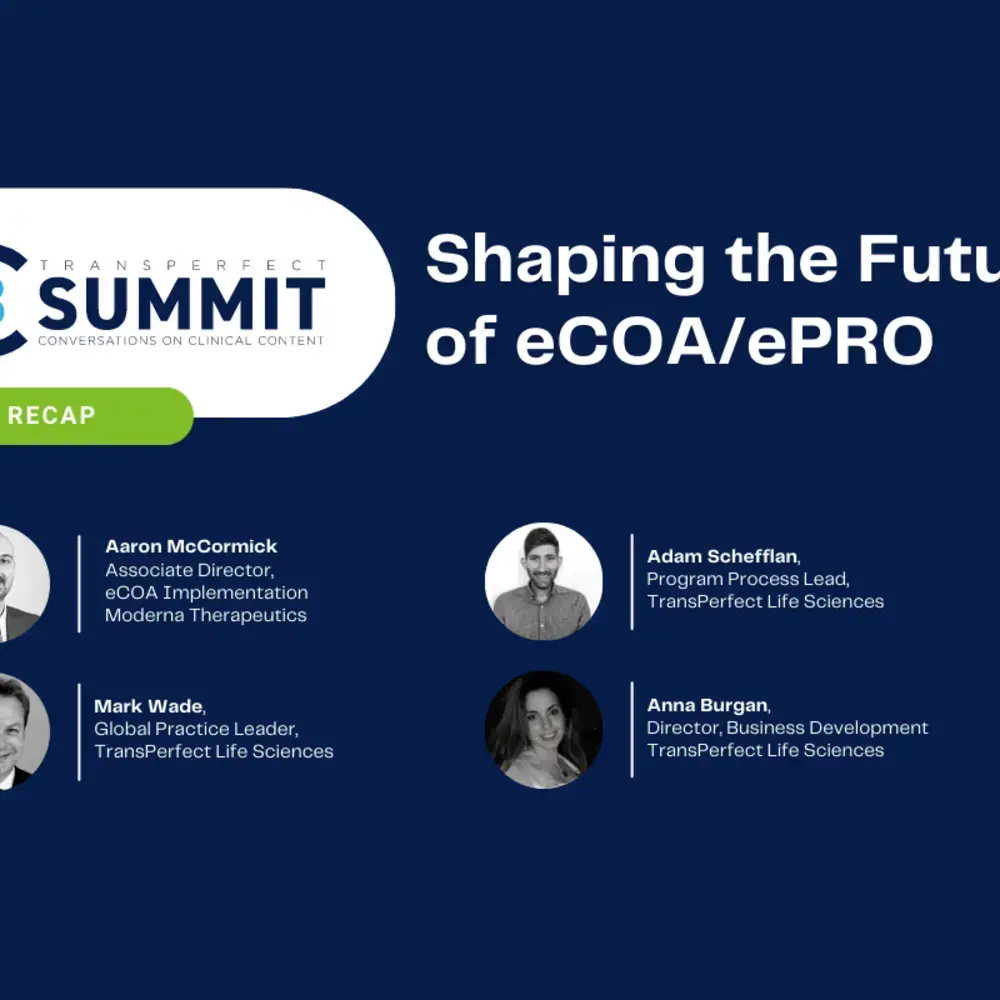C3 Summit Recap: Shaping the Future of eCOA/ePRO Highlights

The paper to digital migration of eCOAs/ePROs has been quite the journey, particularly in light of COVID-19. The rapid shift to decentralized clinical trials required pharma companies and CROs to adapt data capture techniques quickly while remaining compliant with local regulations.
We recently hosted our annual virtual C3 Summit, which included speaker Aaron McCormick from Moderna. For those who weren’t able to attend, we wanted to share some highlights, focusing on this year’s theme of “Shaping the Future of eCOA/ePRO.”
Session 1: Lessons Learned Capturing Electronic Patient Data in the Rush for the COVID-19 Vaccine
How can we collect accurate patient data for a new, fast-spreading disease through a decentralized clinical trial quickly, effectively, and safely? That was the overarching topic of discussion between Aaron McCormick and Mark Wade, Global Practice Leader at TransPerfect Life Sciences.
McCormick highlighted several key considerations in facilitating accelerated patient data collection, including study design, workflows, technology, and patient safety. Specifically, McCormick cited:
- The successful use of a hybrid model for provision devices vs. BYOD (bring your own device).
- Improving upon the standardization of patient e-diaries to reuse for future studies
- Developing a more robust UAT (User Acceptance Testing) process
- Working with a COA vendor with reporting capabilities on the backend for data monitoring
- The importance of establishing a clear, transparent, and communicative relationship on scope, timelines, and expectations between vendor and sponsor to ensure efficiencies and reuse
- Training site staff, patients, monitors, and Moderna employees on how the system operated as well as expectations
- Partnering with a qualified translation vendor for accurate COA adaption of English to Spanish
McCormick’s session ended with him touching upon Moderna’s plan for future COVID variants, and how the Phase III US-based COVID-19 clinical trial has paved the way for future ones to ensure vaccine deployment success.
“We [Moderna] are trying to make things as efficient and scalable as possible.”
– Aaron McCormick
Session 2: Innovations in eCOA Migration Technology
Migrating COAs from paper to digital is a complex undertaking. There’s little room for error when it comes to converting legacy content to the digital version.
Adam Schefflan, Global Practice Leader of TransPerfect, explained that even the most minor of changes in verbiage, synonyms, etc., could impact how the patient responds to the question. This could then affect the entirety of data collection.
Schefflan also noted that there are some adaptions necessary when migrating to a digital format (i.e., “Click here” rather than “Circle here”). Regardless of the number of adaptions, it is a tedious and time-consuming process. This tedium is exactly the type of problem GlobalLink XCompare is meant to resolve.
Christina Farah and Anna Burgan from TransPerfect joined the conversation to explain this in detail. By having the technology track changes and allow for edits within the system, XCompare enables shortened turnaround times and reduced errors.
This was further demonstrated through real-world examples of the application’s use for life sciences organizations.
“By introducing this groundbreaking technology, we were able to reduce migration errors caused by the previous manual process by 97%.”
– Christina Farah
Session 3: How to Set Up Your eCOA/ePRO Solution for Success
The C3 Summit concluded with Mark Wade, who discussed the current landscape of eCOA/ePRO and how it has changed in the past two decades.
He focused on drivers, including COVID-19, that have had an astronomical impact on patients and studies globally. He also gave suggestions on how to ensure a successful implementation for eCOA/ePRO solutions.
As part of this, he provided a checklist for setting yourself up for a successful eCOA/ePRO deployment. Some key items included:
- Automating screen review as much as possible
- Ensuring your language service provider (LSP) is employing suitable, qualified, and experienced resources for the translation process
- Leveraging technology to reduce the number of reviews
“If you are US-focused, for whatever reason, you’re missing the trick, because more than half of the studies executed today are non-US.”
– Mark Wade
While the road from paper to digital has not been easy, it is clear that eCOA/ePRO is the future for patient data collection.
As life sciences organizations continue to innovate life-saving treatments, and as technology continues to advance, there will undoubtedly continue to be changes in the way we capture patient data. We’d like to give a big thank you to our speakers and those who attended this year’s C3 Summit—we hope to see you all again next year!
If you missed the chance to see the sessions, don’t stress; we’ve got you covered! All sessions can be viewed here.
Interested in learning more about the C3 Summit or looking for more information on our eCOA/ePRO service offerings? Contact us here.
